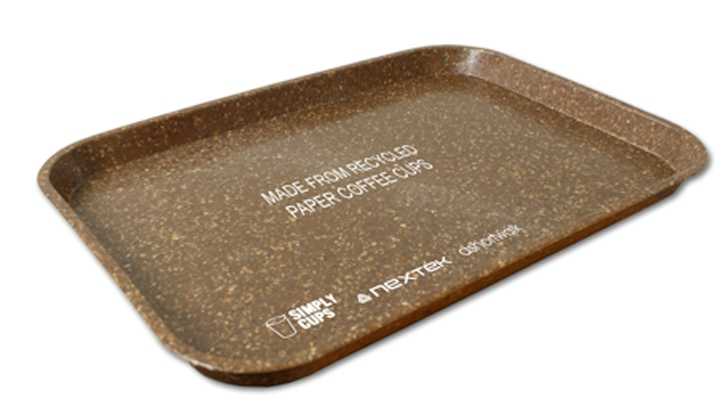Nextek has developed a unique resin made from whole coffee cups that can be moulded into a number of strong and durable products. Less than 0.25% of the estimated 3 billion paper cups used annually in the UK alone are being recycled, Nextek said – but calls for disposable paper cups to be more widely recycled ignore the complex challenge of separating out the paper from the plastic layer which makes it leak-proof.
Nextek’s new recycling technique avoids this problem by capitalising on the strengths of the two materials in their combined form.
Edward Kosior, managing director of recycling consultancy for Nextek, said: “We have used our expertise in polymer composites to develop innovative mixtures of the high-quality paper fibres and plastic coatings and the occasional lid, spoon and straw into high-strength composites that can be used in a wide range of building and consumer products.
We have named this NextCupCycle resin. One recycling plant could recycle half of the annual volume of UK coffee cups, creating many durable long-life products and displacing virgin materials.”
Where small volumes of cups are currently recycled, only the paper can be reused. This limits the amount of products they can manufacture, according to the MD of AShortWalk, which specialises in the design and manufacture of products made from recycled materials.
“It’s easy to forget that nothing is truly recycled until it’s been physically reused,” said Dan Dicker. “A solution like this that opens up wider product possibilities will create a far bigger demand for the recycled cups and close an economic – as well as a recycling – loop.
“This is why we are launching this technology in conjunction with Nextek in a number of new products that can be used in coffee shops and cafeterias in cooperation with Simply Cups this week as they have pioneered the collection of cups in London to the correct specification required by the Nextek recycling process”.
And Nextek’s Jonathan Mitchell said: “Our unique technology has focused on improving the adhesion of the coffee cup paper fibres to the plastic and our trials have shown that the composite, that can readily use 40% by weight of coffee cups, is much stronger than conventional plastics and can be readily moulded into products at high speeds.”
The new method removes the entire separation process currently involved in the recycling of paper cups.
And according to Dr Chris Cheesman of Imperial College London, “paper cups use very high-quality, very strong cellulose. So the flakes can turn a brittle and not especially tough plastic into something much tougher.
“This makes the material particularly suitable for turning into products where wood is still often used today,” claimed Dr Cheesman.
Importantly, the paper and plastic flakes could be combined with plastics recovered from waste electronic and electrical equipment – estimated to generate up to 9.1 million tonnes of waste a year in the EU.


















